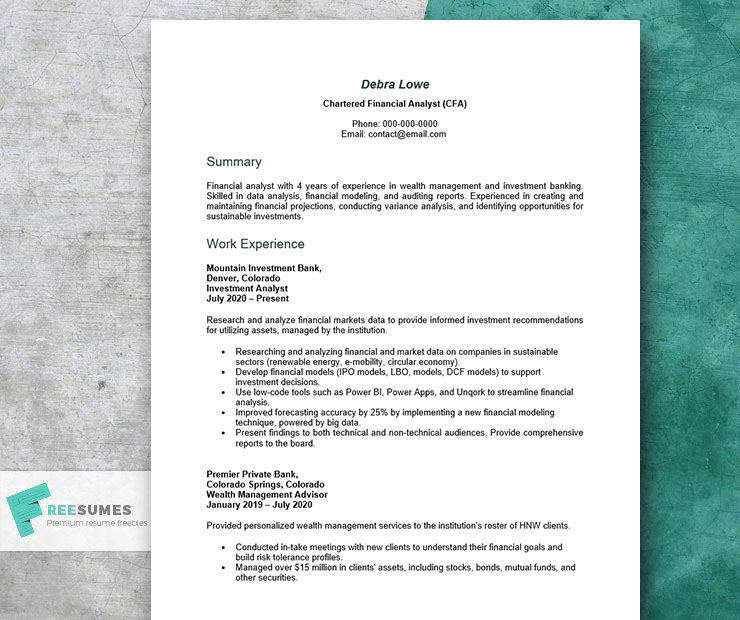Financial analysts are tasked to transform complex financial data and market trends into insights for business decisions. Their resumes must demonstrate a combination of financial expertise, analytical skills, and the ability to present complex information in understandable sound bites.
To help you craft a winning copy like that, we’ve prepared a detailed sample financial analyst resume, followed by actionable tips for customization.
Financial Analyst Resume Example (Word)

Financial Analyst Resume (plain text)
Debra Lowe, Chartered Financial Analyst (CFA)
Financial analyst with 4 years of experience in wealth management and investment banking. Skilled in data analysis, financial modeling, and auditing reports. Experienced in creating and maintaining financial projections, conducting variance analysis, and identifying opportunities for sustainable investments.
Work Experience
Mountain Investment Bank, Denver, Colorado
Investment Analyst
July 2020 – Present
Research and analyze financial markets data to provide informed investment recommendations for utilizing assets, managed by the institution.
- Researching and analyzing financial and market data on companies in sustainable sectors (renewable energy, e-mobility, circular economy).
- Develop financial models (IPO models, LBO, models, DCF models) to support investment decisions.
- Use low-code tools such as Power BI, Power Apps, and Unqork to streamline financial analysis.
- Improved forecasting accuracy by 25% by implementing a new financial modeling technique, powered by big data.
- Present findings to both technical and non-technical audiences. Provide comprehensive reports to the board.
Premier Private Bank, Colorado Springs, Colorado
Wealth Management Advisor
January 2019 – July 2020
Provided personalized wealth management services to the institution’s roster of HNW clients.
- Conducted in-take meetings with new clients to understand their financial goals and build risk tolerance profiles.
- Managed over $15 million in clients’ assets, including stocks, bonds, mutual funds, and other securities.
- Used the proprietary next-best-action system to fine-tune asset management strategies and deliver better outcomes for the clients.
Financial Audits, Denver, Colorado
Junior Financial Analyst
October 2017– December 2018
Worked as a part-time, later — full-time, junior financial analyst for a firm, specializing in financial audits for larger enterprises.
- Developed and maintained financial projections and budgets for two major enterprises (turnover above $250M).
- Researched and reported up-to-date economic and industry trends that may impact the organization.
- Conducted a thorough audit of the company’s expenses, identifying and negotiating more favorable terms with suppliers and service providers, resulting in a 10% reduction in indirect costs.
Education
Bachelor’s Degree in Finance,
Colorado State University,
2014-2017
G.P.A.: 3.8/4.0
Certifications:
- Chartered Financial Analyst (CFA), issued in 2021
- PL-300: Microsoft Power BI Data Analyst, issued in 2022
How to Write a Financial Analyst Resume
The finance industry is data-driven. Therefore, your resume has no room for fluff. Be straight to the point: Sum up your duties and share a couple of quantifiable accomplishments for each position you held. In particular, draw the outcomes you’ve achieved for your employer or for their end clients.
That said, your resume shouldn’t be all cut and dry. After all, most financial analysts work as part of cross-functional teams and often have to report findings to clients or stakeholders. Therefore, you should also highlight your soft skills — strong communication abilities, teamwork, client relationship management, etc.
Finally, all of the above have to fit into one page — the standard resume length. Sounds like an impossible mission? We have tips to help you out.
1. Use Strong Action Verbs
Financial analysts are trusted advisors to businesses since they advise on crucial decisions. So there’s no room for wishy-washy statements in your resume. It must sound confident and professional.
To strike the right tone of voice use strong verbs, also known as “irregular verbs”. These verbs help strengthen your writing and make you sound more authoritative.
Examples of strong verbs for a resume include: “Build”, “begin”, “give”, “hold”, “lead”, “learn”, “make”, etc.”
2. Emphasize Your Analytical Skills
Financial analysts are expected to be adept at analyzing data and making informed decisions based on the built models and forecasts. Explain what analytical skills and methods you apply in your day-to-day work. Be specific and mention:
- Common financial forecasting methods such as time series, analysis, Delphi method, Monte Carlo simulation, scenario planning, regression analysis, etc.
- Popular financial modeling techniques such as Discounted cash flow (DCF) model, initial public offering (IPO) model, three-statement model, etc.
- Specific financial or data analysis software you know how to use e.g. Power BI, Causal, Jedox, etc.
Need more ideas? Check our post about other resume-worthy analytical skills.
3. Always Add a Resume Summary
Once you’re done organizing the resume body, switch to working on the header area. There are different ways to style an attention-grabbing resume header area:
- Add a professional title, plus links to social media (LinkedIn, website)
- Add a photo headshot with a professional tagline
- Write a compelling resume summary
The last is the best option. A resume summary provides the reader with a quick preview of your resume. When written well, it entices them to read through your copy, rather than skim it. Be sure to mention some of your most competitive skills, educational credentials, or achievements in the header area!
Final Tip: Proofread Your Resume Carefully
Attention to detail is a must-have skill for financial skills. Nothing can muddle the first impression more than a resume copy with sloppy spelling or grammar mistakes. So before you hit “send”, take another careful look at your resume and run it through a grammar-checking app once again just in case.






